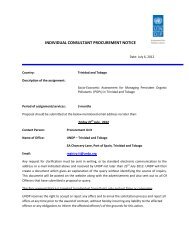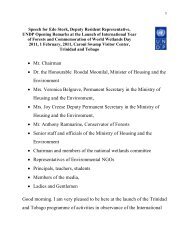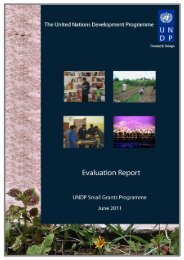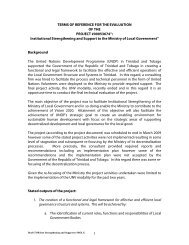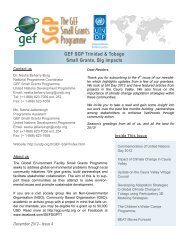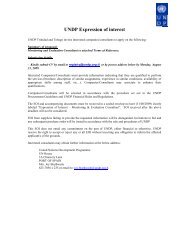The View from the Boardroom - UNDP Trinidad and Tobago
The View from the Boardroom - UNDP Trinidad and Tobago
The View from the Boardroom - UNDP Trinidad and Tobago
Create successful ePaper yourself
Turn your PDF publications into a flip-book with our unique Google optimized e-Paper software.
<strong>The</strong> <strong>View</strong> <strong>from</strong> <strong>the</strong> <strong>Boardroom</strong> - CEO Study on Corporate Social Responsibility in <strong>Trinidad</strong> <strong>and</strong> <strong>Tobago</strong>CHAPTER 2Government, Consumers <strong>and</strong> Employees – <strong>The</strong> Drivers of CSRWould you welcome <strong>the</strong> development of a nationalCSR Policy as a st<strong>and</strong>ard-setting framework for <strong>the</strong>Private Sector?11.4%can <strong>and</strong> should do to encouragecorporate citizenship. Ra<strong>the</strong>r <strong>the</strong>challenge is whe<strong>the</strong>r <strong>the</strong> governmentcan find ways to raise <strong>the</strong> strategicsignificance of corporate citizenship inaddressing social <strong>and</strong> environmentalchallenges, both to business as animperative <strong>and</strong> as an enabler of moreeffective government policy, bothnationally <strong>and</strong> on <strong>the</strong> global stage.” 2588.6%YesNoSector need to play a more activerole in honouring <strong>the</strong>ir obligationsas signatories to <strong>the</strong> social contract.Govind Maharaj, CEO of <strong>the</strong> TruValusupermarket chain operator EasternCommercial L<strong>and</strong>s Ltd. points outthat “people are at different levels ofhow <strong>the</strong>y see CSR so to get everybodyto comply <strong>and</strong> to head in <strong>the</strong> samedirection at <strong>the</strong> same speed is goingto be difficult.” Never<strong>the</strong>less, <strong>the</strong>prospect of forging social partnershipsacross sectoral lines seems to be anidea that is increasingly embracedby greater number of companies in<strong>Trinidad</strong> <strong>and</strong> <strong>Tobago</strong>. Fur<strong>the</strong>rmore,becoming a protagonist of CSR itself<strong>and</strong> intervening through policyinitiatives <strong>and</strong> o<strong>the</strong>r forms of ‘soft’regulations would give <strong>the</strong> governmentan opportunity to spearhead nationalefforts of ‘greening’ <strong>the</strong> economy inline with its own policy objectives<strong>and</strong> responding to <strong>the</strong> evidentenvironmental vulnerabilities of<strong>the</strong> country. Reflecting on <strong>the</strong> roleof government in CSR in what hecalls ‘Third Generation CorporateCitizenship’, Simon Zadek remarksthat “<strong>the</strong> issue is not merely whe<strong>the</strong>r<strong>the</strong>re are things that <strong>the</strong> governmentAs traditional dividing lines betweenissues, responsibilities, portfolios<strong>and</strong> public versus private ‘turfs’ arebecoming increasingly blurred, CEOsare keenly aware of <strong>the</strong>ir changingrole in society <strong>and</strong> of <strong>the</strong> way inwhich political decision-makers <strong>and</strong>members of <strong>the</strong> public are viewing<strong>the</strong>ir contribution to <strong>the</strong> social <strong>and</strong>environmental development of <strong>the</strong>country. This is reflected in <strong>the</strong> 75.8%of all CEOs that have expressed <strong>the</strong>irbelief that companies are increasinglyexpected to take over parts of socialservice delivery previously reservedfor governments. In o<strong>the</strong>r words, <strong>the</strong>role of government is being re-definedas a result of <strong>the</strong> growing strains onpublic resources <strong>and</strong> its dependenceon <strong>the</strong> social engagement of privatecapital suggests <strong>the</strong> emergence ofa new division of labour betweencompanies <strong>and</strong> <strong>the</strong> state with <strong>the</strong> latterto provide <strong>the</strong> regulatory frameworkfor <strong>the</strong> former to deliver social goods<strong>and</strong> services in particular areas.In many countries, an importantdriver for <strong>the</strong> CSR business caseis consumers. Businesses, manyCSR practitioners argue, havebeen prompted into changing <strong>the</strong>ircorporate behaviour as well as <strong>the</strong>nature of <strong>the</strong>ir production processes<strong>and</strong> manufacturing conditionsbecause of <strong>the</strong> pressure generatedthrough ‘ethical consumerism’.<strong>The</strong> latter contains both a positive(‘reward’) <strong>and</strong> negative (‘punishment’)Rationale for Public SectorInvolvement in CSR<strong>The</strong> defensive justifaction forpublic sector actors in middle<strong>and</strong>low-income countriesrelates to minimizing <strong>the</strong>potentially adverse effects ofCSR on local communities,environments <strong>and</strong> marketswhen it is imposed throughinternational supply chains<strong>and</strong> investment.<strong>The</strong> proactive justification forpublic sector actors to engagewith CSR is provided by <strong>the</strong>opportunity to increase <strong>the</strong>domestic public benefits ofCSR practices in economic,social <strong>and</strong> environmentalterms.Adopted <strong>from</strong> ‘CSR <strong>and</strong>Developing Countries – WhatScope for Government Action’,UN Department of Economic<strong>and</strong> Social Affairs, SustainableDevelopment InnovationBriefs, Issue 1, February 200725 Simon Zadek, Third Generation Corporate Citizenship – Public Policy <strong>and</strong> Business in Society, <strong>The</strong> Foreign Policy Centre <strong>and</strong> AccountAbility 2001, p.14.39




